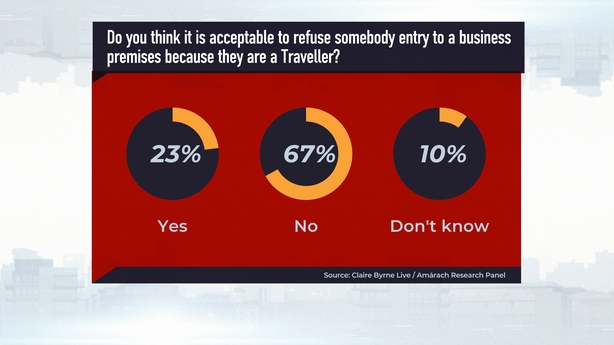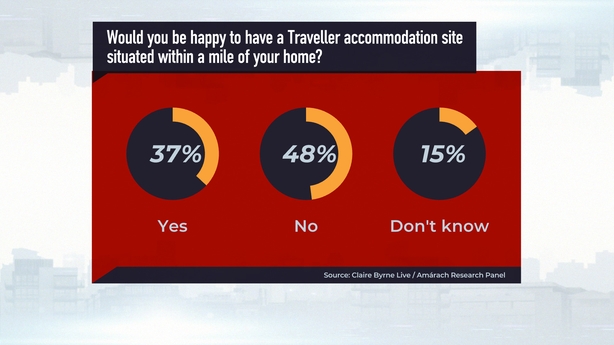Almost 50% of Irish people would not be happy to live near a Traveller halting site, according to a poll carried out for Claire Byrne Live by Amárach Research.
Some 48% of people polled said that they would not be happy for a Traveller accommodation site to be situated within a mile of their home. Some 37% of respondents said they would not object, while 15% said they did not know.
In principle, a minority of people, 37%, agreed that it was acceptable to object to a housing development "because it is for Travellers". Some 50% of respondents disagreed with that statement.
Taken together – and excluding don't knows – the findings suggest that a majority are in favour of Traveller accommodation in principle. But a majority also object to a Traveller site actually being located near their own home. That finding suggests that charges of "nimbyism" on the part of many settled communities are not without foundation.
The poll was carried out on Monday among a sample of 1,000 adults participating on their smartphones.

Strikingly, a majority said no to living near Traveller accommodation even though the question specified that the accommodation would be "within a mile of your home".
Opposition is higher outside Dublin, but it’s noticeable that, even in the capital, where most people would say that a mile is a long way, feelings were evenly split (43% wouldn’t object while 42% would).
Local opposition is one of the reasons why just two-thirds of money allocated to local authorities for Traveller-specific accommodation was drawn down over 10 years, with €58m unspent, according to a report by the Irish Human Rights and Equality Commission in 2021.
Earlier this month, the European Commission described the living conditions of Travellers in Ireland as "deplorable".
It said that there had been "no major improvement" in the situation in the last three years. Some 70% of Travellers live in caravans or overcrowded accommodation. Figures from 2019 show that 529 Traveller families were living by the side of the road, usually without basic facilities such as running water.
More hearteningly for Travellers, the fact that people are opposed to discrimination in principle was replicated in the other major finding of this poll.

Two out of every three people surveyed said that it is "not acceptable" to refuse someone entry to a business premises on the grounds that they are a Traveller.
Nevertheless, almost one in four (23%) said that it is acceptable, while 10% said they didn’t know.
The last five years have been important ones in shaping and revealing public attitudes towards the Traveller population. In March 2017, the Irish Government formally recognised Travellers as an ethnic minority in Ireland, something for which Travellers had campaigned for decades.
It represented an important recognition of the status of Travellers and made possible extra protections for Travellers against discrimination.
But the cause of Travellers' rights received a significant setback the following year when Peter Casey shot from nowhere to second place in the 2018 Presidential election, polling 22% largely on the basis of dismissing Travellers' ethnicity and criticising Traveller accommodation arrangements.
The ease with which his stance turned around his electoral fortunes came as a shock to many although it must be said that his subsequent electoral performances haven’t quite lived up to his debut.
It all suggests that there is much work to do before Travellers are an equally respected demographic within Irish society. Perhaps the starkest finding of all comes in the fourth question people were asked in the poll: Are there any Travellers in your social circle?
85% of people said No while only 12% - or one in eight – said Yes. That finding was replicated across all age groups, regions and social classes although there is evidence that in Connacht/Ulster socialising with a member of the Traveller community is slightly more usual at 18%.

